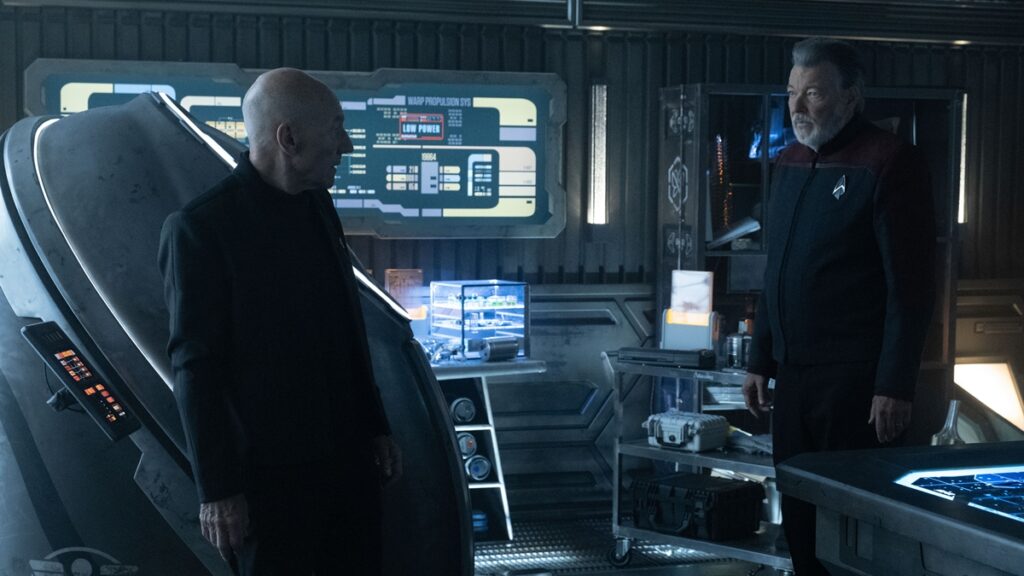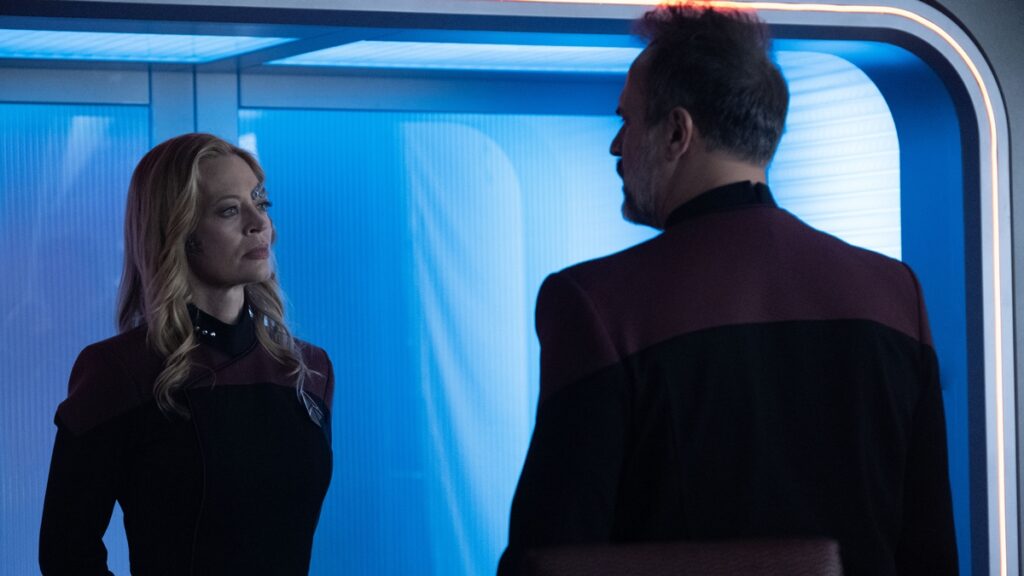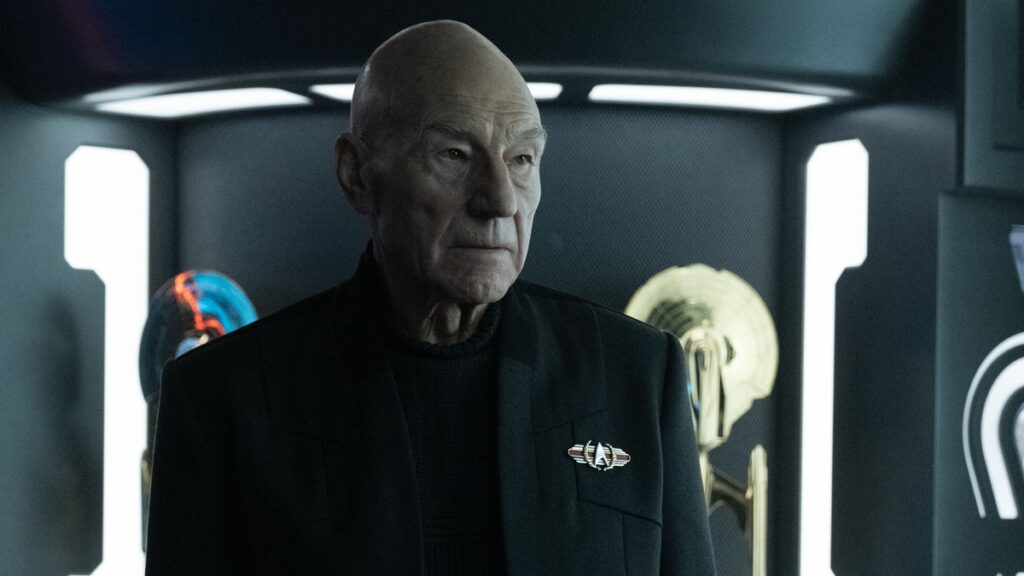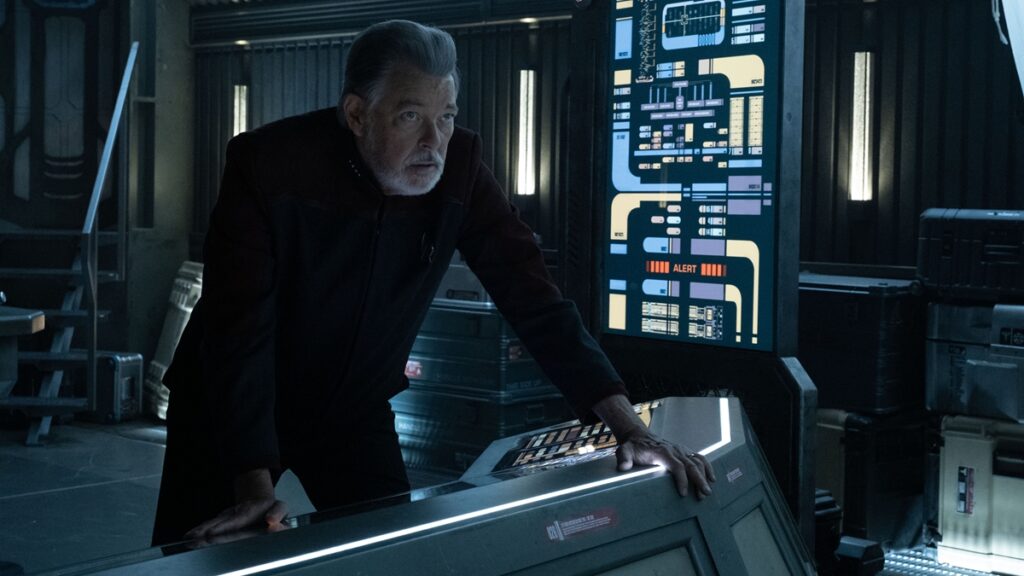Read also:
How to Watch FX Live Without CableHow To Watch AMC Without CableHow to Watch ABC Without CableHow to Watch Paramount Network Without CableThe question of whether to turn over a familiar rogue to the bad guys echoes classic beats from The Next Generation.
Contrary to popular belief, the lifeblood of Star Trek: The Next Generation was more than skirmishes with malevolent aliens or the latest weird spatial phenomenon. It was, instead, the classic moral dilemmas that challenged the mettle of the main characters. More often than not, the space battles and technobabble were a side dish to Jean-Luc Picard (Patrick Stewart) and company having to confront some thorny ethical conundrum. Do I stick with what’s expedient and practical, or do I make the harder call and stand behind my principles?
For all its added flash and pizazz, “Disengaged,” the second episode from Star Trek: Picard’s third season, is essentially a TNG-style moral dilemma buffed with the trappings of modern television. Yet another alien foe in an imposing warship demands a Starfleet vessel turn over some wanted criminal on pain of death and destruction. So what do you do?
Do you hand the scoundrel over to save your crew from a bruising fight, knowing it’ll likely mean the young man dies? Or do you stand your ground and declare that whatever his sins, this poor soul deserves a fair trial and a chance for redemption rather than swift judgment and summary execution? The beauty of the form, in both past and present, is that it puts us in the captain’s chair.
 Paramount+)" class="wp-image-40224"/>
Paramount+)" class="wp-image-40224"/>In that vein, Captain Shaw (Todd Stashwick) is growing on me. He seems like a bit of a Jellico — all elbows and sneers instead of friendship and philosophy. But it’s a shame that Star Trek: Picard sketches him as a complete dick to our favorite characters because he makes a fair point here.
However reflexively jerky Shaw is to Picard, Riker (Jonathan Frakes), and especially Seven (Jeri Ryan), he’s not wrong to want to prioritize protecting the five hundred souls aboard the USS Titan over the life of some random conman who seems less-than-blameless for the bounty on his head. After all, the needs of the many outweigh the needs of the few or the one.
And yet, here is Jean-Luc Picard, doing what he does best—standing up for a greater moral principle, beyond the exigencies of the moment, because by god, it’s what’s right. He shows compassion to those who have fallen on hard times, striving to find a reason to do the tough but moral thing rather than the easy but ethically queasy thing. And ultimately, he makes a case for this embattled scoundrel and looks for another option, be it through diplomacy or guile, instead of sending another young man to his probable death.
And yet, here is Jean-Luc Picard, doing what he does best—standing up for a greater moral principle, beyond the exigencies of the moment, because by god, it’s what’s right.
Therein lies one of the sharpest choices this series has made: return to those rhythms and the types of problems that fueled the best outings for The Next Generation, even as they’re magnified to the more dramatic, life-or-death scale of modern serialized television.
Were that the same could be said for the Raffi (Michelle Hurd) subplot. In some ways, the show’s approach to her is admirable. The series’ creative team has focused much of this season on dredging up the ghosts of the 1987 series. Every one of Star Trek: Picard’s original characters have beenjettisoned save for Raffi. So taking time to service her here and call back to character elements introduced in the show’s first season — whether it be her addiction, her propensity to fall into obsessions and conspiracy theories, or her estranged son — is laudable. Closing off the loop for the last original character left standing is theoretically a good thing.
Here’s the problem — it’s hard to care about any of those elements given the shaky writing those facets of her character have received to date. Raffi arguably hit her peak in season 2, as the show built on her dynamic with Seven and focused her talents elsewhere. However, returning her to breathless arguments with droning voices on the screen or exes forcing her to choose between her mission and her son grows tiresome quickly.
 Paramount+)" class="wp-image-40222"/>
Paramount+)" class="wp-image-40222"/>Thankfully her hunt for the big bad behind the terrorist attack on a Starfleet Recruitment Center is, if nothing else, plot-relevant. And hey, there’s even another moral dilemma involved! (Thematic coherence, hurrah!) But given the season’s retrospective bent, and Raffi’s shaky treatment to this point, it’s tough for this material to feel like anything but a side dish.
Nevertheless, at least the episode doesn’t string the audience along over the question of who her mysterious handler is. When Raffi’s in a tough spot with a Ferengi gangster, who should save the day but the son of Mogh himself, good ol’ Worf (Michael Dorn)! The onetime Enterprise security chief turns out to be rescuing his disobedient agent, despite giving her the titular warning to disengage (the source of another cheeky title given Picard’s famous catchphrase).
Still, the real action is on the Titan, where our heroes are in a standoff with a gargantuan ship and its captain, who’s given them one hour to turn over her target or be destroyed. Again, in keeping with the tropes of TNG, the baddie with mysterious weapons that put Starfleet at a disadvantage, the question of whether to acquiesce or make a stand, and the trademark ticking clock, all help give the episode some extra oomph.
But the countdown also gives us time to get to know our two new players. One of them is Vadic (Amanda Plummer), the captain of the Shrike, brandishing an intimidating device powerful enough to smash Beverly’s ship into the Titan’s hull like it’s nothing. Plummer chews the scenery with abandon, as befits the episode’s Khan-esque (or, given Plummer’s parentage, Chang-esque) framing for all of this. Flanked by mysterious henchmen, she monologues with the best of them, teasing our heroes with villain-friendly metaphors and threatening to steadily pick them apart if they don’t comply. Plummer’s presence alone makes Vadic a convincing antagonist, even as her exact motivations remain opaque at this early hour.
 Paramount+)" class="wp-image-40225"/>
Paramount+)" class="wp-image-40225"/>The other newcomer is Jack Crusher Jr. (Ed Speleers), Beverly’s son and the apparent cause of all this trouble. The young man is rough around the edges, with assumed names and enemies made on a dozen worlds. Nonetheless, self-serving or not, Jack frames himself as following his mother’s lead, trying to help people who need it, regardless of the protocols or corruption that keep people from the care they need.
There’s something recognizable in Jack that ties into the episode’s motifs. He’s willing to buck the rules in the name of the greater good and, despite causing so much ruckus, ready to sacrifice himself rather than leave five-hundred souls on the hook for his well-being.
True to form, Jean-Luc tries to get to know this noble ne’er-do-well, to figure out who he really is and if there’s something about his personality or history they can use to save him. As always, Picard seeks out the humanity at the core of this grand ethical question, trying to remember the people who live or die by these decisions rather than the abstract debate. Still, in the end, he’s ready to turn Jack over, or at least not stand in the young man’s way, when he sneaks into a transporter room and tries to beam himself to the Shrike.
In that, “Disengaged” shares in the beauty The Next Generation displayed on a nigh-weekly basis.
Of course, the calculus changes when it turns out Jack is, naturally, Picard’s son. In truth, the choice is a giant cliché. As mentioned last time, this is very much pulling from the Wrath of Khan playbook. Hell, it even bears a striking resemblance to TNG’s “Bloodlines,” the last time Picard thought he’d found a long-lost son, who also just so happened to be a criminal hunted by an alien aggressor. The choice to introduce a late-breaking, heretofore unknown offspring is a potential jump-the-shark moment that’s popped in everything from The Simpsons to Gilmore Girls.
And yet, there’s a lot to like about the choice. For one thing, the way “Disengaged” communicates the reveal is masterful. Riker nudging Picard for half the episode saying, “Don’t you see what I see?” gets to be a little cheesy. But it comes with a point. Picard doesn’t want to acknowledge the possibility Will is hinting at. Instead, he’s tastefully eliding a question he doesn’t want to know the answer to.
And still, all it takes is one look from Beverly (Gates McFadden), with the kind of intuitive shorthand the pair still share despite twenty years apart, and Jean-Luc cannot deny what he already knew in his heart. It’s a grand moment made small and intimate, resting wordlessly on a rapport built over 178 episodes’ worth of adventures. The fact that the simple exchange of expressions between Picard and Dr. Crusher breaks the dam is perfect.
 Paramount+)" class="wp-image-40221"/>
Paramount+)" class="wp-image-40221"/>More to the point, it alters the nature of the decision here, at least for Picard. This isn’t just a random criminal or even an old friend’s child. It’s his son, carrying on the reckless spirit of Picard’s own wayward youth and his urge to do good no matter what the rules demand. Picard vindicates that same impulse in himself and a need to protect a son he just discovered in a way that makes him pull rank and circle the wagons rather than turn Jack over to Vadic.
In that, “Disengaged” shares in the beauty The Next Generation displayed on a nigh-weekly basis. The old show wasn’t content to simply give us sterile ethical questions and academic debates. Instead, it gave us characters, with connections to our immediate and long-standing heroes, that made the personal as important as the philosophical.
A long-lost son at this stage of the game is a cheesy trope. But a moral dilemma complicated by the fact that you care about the person at the center of it is the stuff great TNG episodes were made of. So however “Disengaged” gets there, it’s nice to see Star Trek: Picard remember the hard choices, and harder connections, that made its predecessor so memorable and meaningful.